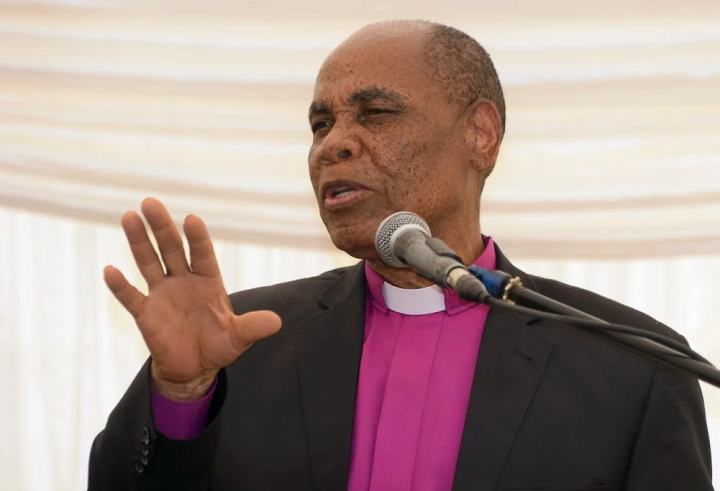The ongoing turmoil within the United Methodist Church (UMC) in Nigeria has escalated further with the recent arrest of Zimbabwean Bishop Eben K. Nhiwatiwa, who had travelled to Nigeria to oversee the election of a new bishop following the resignation of the former bishop, John Wesley Yohanna.
The arrest, which occurred in Yola, Adamawa State, and the subsequent transfer of Bishop Nhiwatiwa to the Nigerian Immigration Service (NIS) headquarters in Abuja, has deepened the existing rift within the church and raised concerns about the involvement of external forces in the church’s internal affairs.
Bishop Nhiwatiwa, a prominent figure within the United Methodist Church, was reportedly detained by operatives of the Nigerian Immigration Service on Friday, 23 August 2024.

The arrest took place at the venue of a scheduled meeting with members of the Southern Nigerian Annual Conference of the United Methodist Church in Yola.
According to a statement released by the church, despite Bishop Nhiwatiwa possessing all the necessary travel documents, he was still apprehended and detained.
The church has expressed deep dismay over the incident, calling on relevant authorities to intervene and ensure the immediate release of the bishop.
The church’s statement, signed by Pastor Salisu Waziri, strongly suggests that members of a breakaway faction within the United Methodist Church in Nigeria may have orchestrated the bishop’s arrest.
This factionalism has been a source of increasing tension within the church, particularly following the last international conference in the United States, where the contentious issue of same-sex marriage led to significant divisions among the global United Methodist community.
In Nigeria, this division has manifested in a struggle for control over church leadership and property, further exacerbating the conflict.
In response to the arrest, the church has called for swift action to secure the bishop’s release, highlighting the potential for further unrest if the situation is not resolved.
The church’s leadership has accused the Nigerian Immigration Service of acting improperly by detaining the bishop, who they argue was carrying out legitimate ecclesiastical duties in line with his role as a senior leader within the global United Methodist Church.
The situation has taken a particularly tense turn in Taraba State, where the state government has ordered the closure of all United Methodist Church branches.
This drastic measure, according to the Special Adviser to the Governor on Security Matters, Charles Maijankai, is intended to prevent a potential breakdown of law and order as tensions rise among church members vying for control of church properties.
Reports indicate that the struggle for leadership within the church has already led to significant unrest, with allegations that security operatives may be used to arrest additional members, including pastors who are aligned with the faction opposing the current leadership.
The arrest of Bishop Nhiwatiwa and the subsequent government actions have raised questions about the extent to which political and security forces are being used to influence internal church matters.
Critics argue that the involvement of the Nigerian Immigration Service in what is essentially a church dispute sets a worrying precedent and could further destabilise the already fragile situation within the United Methodist Church in Nigeria.
Details surrounding the exact reasons for Bishop Nhiwatiwa’s arrest remain unclear, with the Nigerian Immigration Service declining to provide specific information.
An immigration officer, speaking on the condition of anonymity, stated that only the National Headquarters of the NIS could respond to inquiries regarding the bishop’s detention.
This lack of transparency has fuelled speculation and concern among church members and the broader public, who are eager to understand the motivations behind the arrest.
As of the time of this report, Bishop Nhiwatiwa remains in custody at the Immigration Service headquarters in Abuja.
Such situation has drawn significant attention both within Nigeria and internationally, as observers watch to see how the crisis within the United Methodist Church in Nigeria will unfold.
The arrest has not only heightened tensions within the church but has also sparked broader discussions about the role of state institutions in religious disputes and the potential implications for religious freedom and governance in Nigeria.
The coming days will be critical in determining the direction of this conflict, as church leaders and government officials navigate the delicate balance between maintaining order and respecting the autonomy of religious institutions.
The arrest of Bishop Nhiwatiwa has undoubtedly added a new layer of complexity to an already volatile situation, and its resolution will likely have far-reaching consequences for the future of the United Methodist Church in Nigeria.
Support InfoStride News' Credible Journalism: Only credible journalism can guarantee a fair, accountable and transparent society, including democracy and government. It involves a lot of efforts and money. We need your support. Click here to Donate
